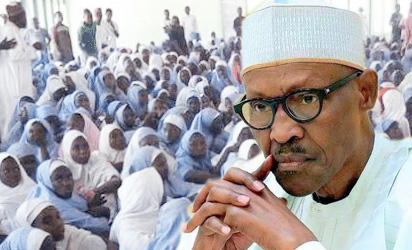It would seem that the pun about Nigerians now waking up, daily, and wondering what exactly will be the next bad news, seems to be sticking, no longer as a joke but reality.
And so it was that last week Monday, February 19, 2018, the nation woke to the tragic news of abduction of 110 girls from Government Girls Science and Technical College, Dapchi, Yobe State, again by members of the Boko Haram terrorist group, which government had severally said had been decimated.

In the same state of Yobe, about four years ago, members of the same terrorists’ sect had invaded the Government Secondary School, Buni Yadi, where they murdered scores of male students of the school.
Also, the Chibok, Borno state incident of 2014, where about 272 girls were kidnapped from their school by the terrorists group, is still fresh in our memories.
Though in the Chibok incident, which presents similar scenario with the Dapchi abduction, some of the girls reportedly managed to escape from their captors. And while about 100 were freed, in exchange for Boko Haram militants following a negotiations said to have been brokered by the International Committee of the Red Cross, over 100 others are still held captive by the Boko Haram.
Incidentally, both abductions happened shortly after security operatives stationed in those locations, were said to have been withdrawn.
But how these terrorists easily disappear into thin air, without a trace, after successfully carrying out such operation, remains a puzzle yet to be solved by any group.
Instead, what one gets to hear after the deed must have been done is likely an outright denial, followed by blames and counter blames as observed in the latest incident between government, police and the Army.
Immediately news of the Dapchi abduction broke early last week, Nigerians were told that no girl was missing. Later on, the story changed that the army had rescued about 50 of them and it didn’t take long for Yobe state government to also make a U-turn, apologising to the people that earlier information on rescue was false.
The dimension also introduced by the Minister of Information, Alhaji Lai Mohammed, to the effect that the abduction was meant to embarrass President Muhammadu Buhari, did not make things any better.
Then came the story of 100 jets being deployed, Wednesday, to search for the girls, an aspect that actually made the whole thing sound like one huge joke. And social media, naturally, made mincemeat of it.
If that story were to fly, it would mean one fighter jet per one missing girl, which is good. But whether Nigeria could afford 100 fighter jets in the skies at the same time left many wondering what the APC-led government wanted to achieve with the bogus claim. It also left many wondering who actually are involved in these abductions, and for what purpose?
A member of the House of Representatives from Bauchi State, Mr. Mohammed Sani-Abdu, actually suspects sabotage in the manner the Dapchi abduction took place, pointing accusing finger at the security system.
“This is a big shame to Nigeria because this incident took a pattern that indicated that our security system is in a serious trouble,” he said.
Another lawmaker from Akwa Ibom State, Henry Achibong, hits harder, describing the Dapchi abduction as “failure of government to cater for the citizenry.”
In fact, he said it might just be a diversion created by government to take the attention of Nigerians away from the killings being carried out by the “rampaging” Fulani herdsmen.
His argument really is that if as we are told that the military has practically defeated Boko Haram, how then is it possible they could abduct this number of girls from a school?
The debate followed after the member representing Dapchi community in the House of Representatives, Mr. Goni Bukar-Lawal, had moved a motion on urgent public importance to bring the plight of the schoolgirls to the attention of the House.
Bukar-Lawal, who said several abductions of pupils by Boko Haram in Yobe State had taken place in the past, unreported, wondered why the military withdrew its men from the area prone to attacks. And pronto, the school was attacked shortly after.
And in line with Speaker Yakubu Dogara’s view, the traumatic experience of the Chibok abduction should have served as a warning to security agencies to provide adequate protection to all schools in the North-East.
To think this is happening in states listed among those with worst girl child education, simply means more apathy to school enrolment for the girl child.
Despite other factors militating against girl-child education in the north, not many parents would gladly allow their wards to go back to school in an environment they are constantly attacked and abducted.
Such a situation, no doubt, will worsen the already alarming rate of female illiteracy in the area that produces the highest adolescent girl marriage, highest under 15 child-bearing and highest risks of maternal death and injury, all of which constitute factors that retard development of any nation.




